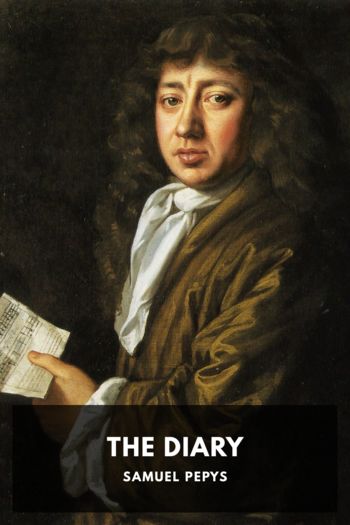The Diary, Samuel Pepys [e reader books TXT] 📗

- Author: Samuel Pepys
Book online «The Diary, Samuel Pepys [e reader books TXT] 📗». Author Samuel Pepys
“Young Hollis on a Muse by Mars begot,
Born, Caesar-like, to write and act great deeds,
Impatient to revenge his fatal shot,
His right hand doubly to his left succeeds.”
—B. ↩
It was an ancient custom in Berkshire, when a man had beaten his wife, for the neighbours to parade in front of his house, for the purpose of serenading him with kettles, and horns and hand-bells, and every species of “rough music,” by which name the ceremony was designated. Perhaps the riding mentioned by Pepys was a punishment somewhat similar. Malcolm (Manners of London) quotes from the Protestant Mercury, that a porter’s lady, who resided near Strand Lane, beat her husband with so much violence and perseverance, that the poor man was compelled to leap out of the window to escape her fury. Exasperated at this virago, the neighbours made a “riding,” i.e. a pedestrian procession, headed by a drum, and accompanied by a chemise, displayed for a banner. The manual musician sounded the tune of “You round-headed cuckolds, come dig, come dig!” and nearly seventy coalheavers, carmen, and porters, adorned with large horns fastened to their heads, followed. The public seemed highly pleased with the nature of the punishment, and gave liberally to the vindicators of injured manhood. —B. ↩
The Golden Hand was to have been used for the conveyance of the Swedish Ambassadors’ horses and goods to Holland. In August, 1667, Frances, widow of Captain Douglas and daughter of Lord Grey, petitioned the king “for a gift of the prize ship Golden Hand, now employed in weighing the ships sunk at Chatham, where her husband lost his life in defence of the ships against the Dutch” (Calendar of State Papers, 1667, p. 430) ↩
That is, the blockhouse. There were formerly considerable fortifications at Gravesend, and about the year 1778 they were greatly extended under the superintendence of Sir Thomas Hyde Page; a few years since, however, a great portion was dismantled, the ground was sold, and the “Terrace Pier,” and other works ejusdem generis erected. —B. ↩
An error for Sir John Griffith, Governor of Gravesend and captain of West Tilbury Blockhouse, who was knighted at Whitehall, January 2nd, 1665. His name appears in the State Papers almost as often as Griffin as Griffith. ↩
There had been correspondence with Pett respecting this chain in April and May. On the 10th May Pett wrote to the Navy Commissioners, “The chain is promised to be dispatched tomorrow, and all things are ready for fixing it.” On the 11th June the Dutch “got twenty or twenty-two ships over the narrow part of the river at Chatham, where ships had been sunk; after two and a half hours’ fighting one guard-ship after another was fired and blown up, and the enemy master of the chain” (Calendar of State Papers, 1667, pp. 58, 87, 215). ↩
The account of this national disgrace is very characteristic, in Poems on State Affairs, vol. i, p. 48, in the Advice to a Painter, ascribed to Sir John Denham. —B. ↩
Samuel’s uncle William told him that William Pepys was born at Dunbar, in Scotland, brought up by the Abbot of Crowland, placed by him at Cottenham, and made “baylifife of all his lands in Cambridgeshire.” He died in 1519, leaving issue three sons and three daughters. There were, however, earlier Pepyses at Cottenham. ↩
Vandervelde’s drawings of the conflagration of the English fleet, made by him on the spot, are in the British Museum. —B. ↩
Below London Bridge. ↩
After the Bank Restriction Act, in 1797, guineas were sold for 27s. —B. ↩
On June 14th John Clapham wrote from Chatham a letter to Pepys describing the doings of the Dutch fleet (Calendar of State Papers, 1667, p. 185). ↩
See July 28th, 1664, and January 11th, 1667. ↩
William Pierrepont, called “wise Pierrepont,” younger son of the first Earl of Kingston, and brother to the Marquis of Dorchester. His grandson, Robert, succeeded as third Earl of Kingston. —B. ↩
See March 28th, 1664. ↩
See February 20th, 1664–65. Evelyn’s Diary, September 18th, 1683:
“After dinner I walked to survey the sad demolition of Clarendon House, that costly and only sumptuous palace of the late Lord Chancellor Hyde. … The Chancellor gone, and dying in exile, the Earl his successor sold that which cost £50,000 building to the young Duke of Albemarle for £25,000. … He sold it to the highest bidder, and it fell to certain rich bankers and mechanics who gave for it and the ground about it £35,000; they design a new town, as it were, and a most magnificent piazza (i.e. square).”
—B. ↩
The want of ammunition when the Dutch burnt the fleet, and the revenge of the deserter sailors, are well described by Marvell:
“Our Seamen, whom no danger’s shape could fright,
Unpaid, refuse to mount their ships, for spite
Or to their fellows swim, on board the Dutch,
Who show the tempting metal in their clutch.
Oft had he [Monk] sent, of Duncombe and of Legge,
Cannon and powder, but in vain, to beg:
And Upnor’s Castle’s ill-deserted wall,
Now needful does for ammunition call,
He finds, where’er he succour might expect,
Confusion, folly, treachery, fear, neglect.”
—B. ↩
Meaning, apparently, that the Ordnance would deliver the charcoal, sulphur, and saltpetre separately, but not mix them as gunpowder—a distinction which





Comments (0)